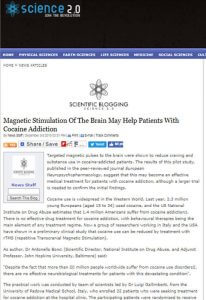Targeted magnetic pulses to the brain were shown to reduce craving and substance use in cocaine-addicted patients. The results of this pilot study, published in the peer-reviewed journal European Neuropsychopharmacology, suggest that this may become an effective medical treatment for patients with cocaine addiction.
There is no effective drug treatment for cocaine addiction, but now a group of researchers working in Italy and the USA have shown that cocaine use can be reduced by treatment with rTMS (repetitive Transcranial Magnetic Stimulation).
The practical work was conducted by team of scientists led by Dr Luigi Gallimberti, from the University of Padova Medical School, Italy, who enrolled 32 patients who were seeking treatment for cocaine addiction. The participating patients were randomized to receive either rTMS or standard symptom-relieving medications.
The experimental group received one rTMS session per day for five days, and then once a week for the following three weeks, for a total of 8 TMS sessions over 29 days. The study indicated that there was significantly less craving and there were a significantly higher number of cocaine-free urine drug tests in the rTMS compared to the control group. In addition, 69% (11/16 patients) in the experimental group showed no relapse to cocaine use, whereas only 19% (3/16) patients) in the control group showed a similar positive result.
Dr Antonello Bonci (Scientific Director, National Institute on Drug Abuse) said:
“rTMS is a non-invasive and very safe therapeutic approach which is used with other mental health and neurological conditions. Our study suggests that rTMS may also represent a new treatment for patients with cocaine use disorder”.
Dr. Bonci continued:
As far as we know, this work represents the first clinical report indicating that rTMS treatment results in significant reduction in cocaine use. We have continued to follow patients from the trial, and the improvement seems to be sustained over time, up to 12 months.
Commenting European Neuropsychopharmacology editor, said:
“This study represents a creative approach to a disorder that is notoriously difficult to treat in the real world”.

